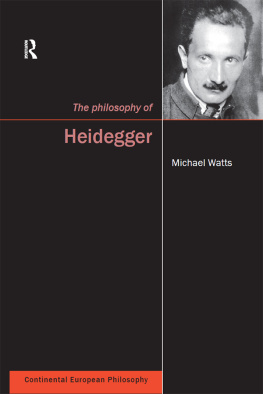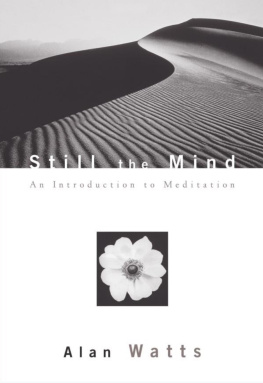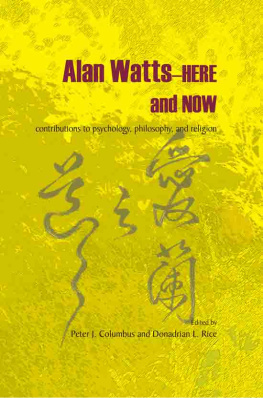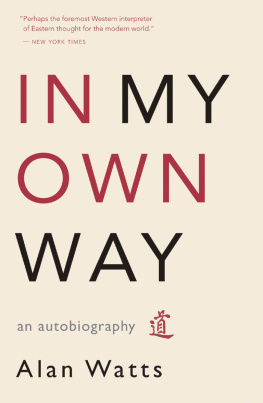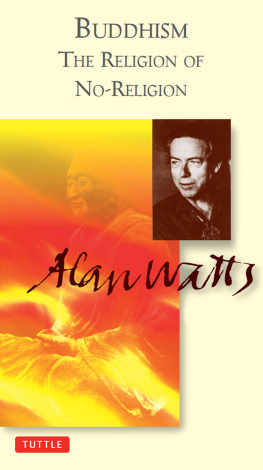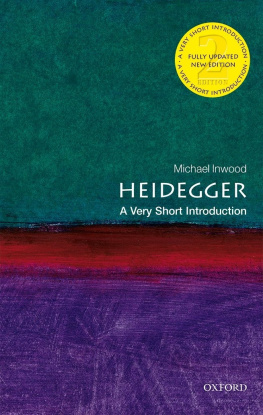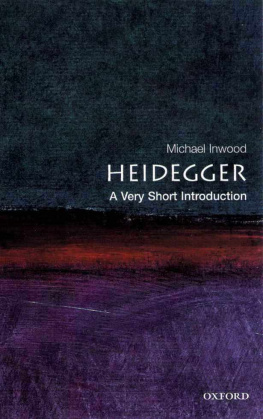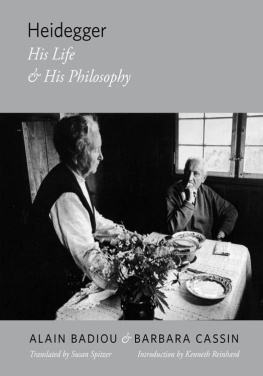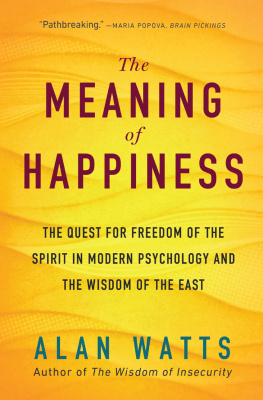Short extracts from reviews of Heidegger: A Beginners Guide
The merit of Michael Watts work what I find particularly appealing about it is his ability to grasp the abstruse and abstract nature of someones thought, and render it in clear, concise, and concrete terms. He is a master at this! As a student in the sixties and seventies, the secondary sources on Heidegger that I consulted were mostly William Richardson, S.J. Thomas Langan, William Barrett, Alphonse De Waelhens, Henri Birault, Otto Poggeler, and few others. Had Watts been available at the time, these sources would have been monumentally superfluous.
(Roy Martinez, Professor and Chair of the Department of Philosophy and Religion at Spelman College, Atlanta, USA)
To write clearly and accessibly, and yet present a philosophers ideas without trivialising or distorting them requires considerable intellectual discipline. This challenge is, arguably, all the more severe in the case of philosophers such as Heidegger and Wittgenstein. Michael Watts rightly repudiates the notion, implied in some of what Heidegger wrote and put about by certain of his followers, that it is suicide for philosophy to be intelligible. Instead he sets about explaining, so far as is possible in such a short space, the main ideas in Heideggers masterpiece Being and Time. Watts also considers the later works in which Heidegger moves farthest from the argumentative canons of Western philosophy. That he treats these works charitably without ever acquiescing in the kind of dazed enchantment they induce in less discriminating minds is a sign that he has understood his responsibilities to the newcomer very well.
(Jonathan Derbyshire, Culture Editor of New Statesman and Managing Editor of Prospect, in The Philosophers Magazine [Summer 2002])
Michael Watts gives an exceptionally clear and readable account of Being and Time, while also performing the difficult feat of weaving this into an account of Heideggers later writings. He provides valuable guidance for the beginner through the complexities of Heideggers thought and much of interest for those who are already on the way.
(Michael Inwood, Trinity College, Oxford)
HEIDEGGER
AN ESSENTIAL GUIDE FOR BEGINNERS
MICHAEL WATTS
Heidegger: An Essential Guide for Beginners
Michael Watts 2001, 2014
All rights reserved. Copyright under the Berne Convention.
A CIP record for this title is available from the British Library.
First published in 2001 as Heidegger: A Beginners Guide by Hodder & Stoughton Educational.
First published in eBook format in 2014.
ISBN: 978-1-78301-542-9
(Print: 0-340-80324-X)
eBook Conversion by www.ebookpartnership.com
CONTENTS
Foreword
Michael Watts gives an exceptionally clear and readable account of Being and Time, while also performing the difficult feat of weaving this into an account of Heideggers later writings. He provides valuable guidance for the beginner through the complexities of Heideggers thought and much of interest for those who are already on the way.
If you knew this would be the last day of your life, how would you spend it? Your answer says a lot about who you are. One answer to Michael Watts question might be that I would write a foreword to his book. But I have no idea whether this is the answer I would give, let alone whether it is the correct answer or even if there is a correct answer. (The question is insufficiently specific. How much time has been allowed for the preparation that my preferred activity might require?) Suppose that I would give this answer, even that it is the right answer. Why should it say more about me than any other days activity? At best, its message is ambiguous. Am I motivated by regard for Heidegger or for Watts, by respect for the literary obligation I have assumed, or even by indifference to my imminent demise? Here, then, I disagree with Watts. But I am grateful to him for these, and other, thoughts provoked by his book.
Michael Inwood
Professor of Philosophy, Trinity College, Oxford
Preface
In the Encyclopaedia Britannica, the opening paragraph on Martin Heidegger reads: German philosopher, counted among the main exponents of twentieth-century Existentialism. He was an original thinker, a critic of technological society, a leading ontologist of his time, and an influence on the younger generation of continental European cultural personalities.
Yet in the history of Western thought since the time of Socrates, no one has been judged in such a wide-ranging and extreme manner as Heidegger.
Bertrand Russell allocated a mere five lines to Heidegger in his A History of Western Philosophy (1946), and described his work as being eccentric and obscure Existentialist psychology masquerading as logic. The analytic philosopher A. J. Ayer labelled him a charlatan, and Roger Scruton, a conservative British philosopher and author, described Heideggers most important work Being and Time as formidably difficult unless it is utter nonsense, in which case it is laughably easy.
In contrast to this, the eminent American philosopher and political theorist Richard Rorty describes Heidegger, in his Philosophy and the Mirror of Nature (1979), as being one of the three most important philosophers of the twentieth century (along with Dewey and Wittgenstein). Other equally respected academics regard him as the most important European philosopher of the twentieth century one of that small number of elite Western thinkers that includes Plato, Aristotle and Descartes.
Heideggers influence is indisputable, and his impact on modern life is widespread in philosophy, literature, poetry, theatre, sociology and even architecture. He has been described as: a German Idealist philosopher concerned with fundamental questions of death, time and the Angst or anxiety of daily life; a master scholar and interpreter of historys most influential philosophers; and a language mystic involved more deeply than any other philosopher with the influence that language exerts on human thought. He was an invaluable contributor to the evolution of the method of philosophy known as phenomenology, which was developed by his teacher Edmund Husserl. In addition, Heidegger was the main influence behind the work of Jean-Paul Sartre, and thus contributed greatly to the development of twentieth-century Existentialism. He has even been regarded as a theological academic who has provided an excellent philosophical basis for modern Christian thought. The most recurrent view of Heidegger, however, is that he is ultimately a philosopher of Being, who pursued the question of the meaning of Being relentlessly until death finally ended his quest.
Heidegger demonstrated remarkable ecological awareness for his time. He expressed strong concern over, and was highly opposed to, many components of the modern industrial society, with its overemphasis on technology and mass culture, and he spoke strongly against the mistreatment of livestock and the abuse of the planets resources. With superb clairvoyance he prophetically warned of the coming destruction of the environment, which would lead to planetary-ecological crises.
There is undoubtedly a very dark side to Heidegger, which has been the greatest cause of controversy surrounding his life: his involvement with Nazism and the political forces, if any, that can be read into his philosophy. He has often been described as a German redneck and a gullible, self-important Nazi and yet there are still academics who insist he was in fact a covert critic of Nazism.
There is also a private side to Heidegger that is still not known, as most of his personal, private papers remain locked away in the German Literary Archive in Marbach, where access has been strictly limited.
Next page

